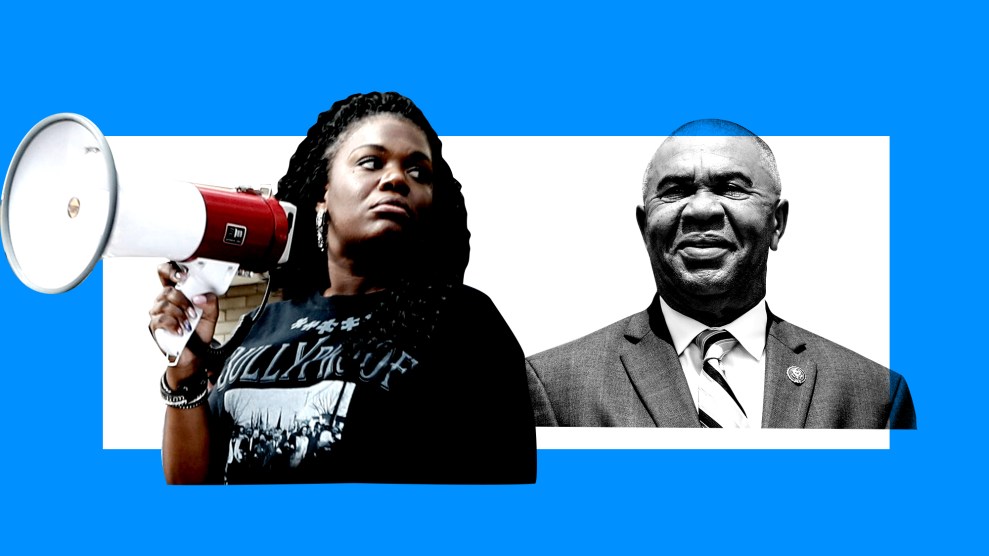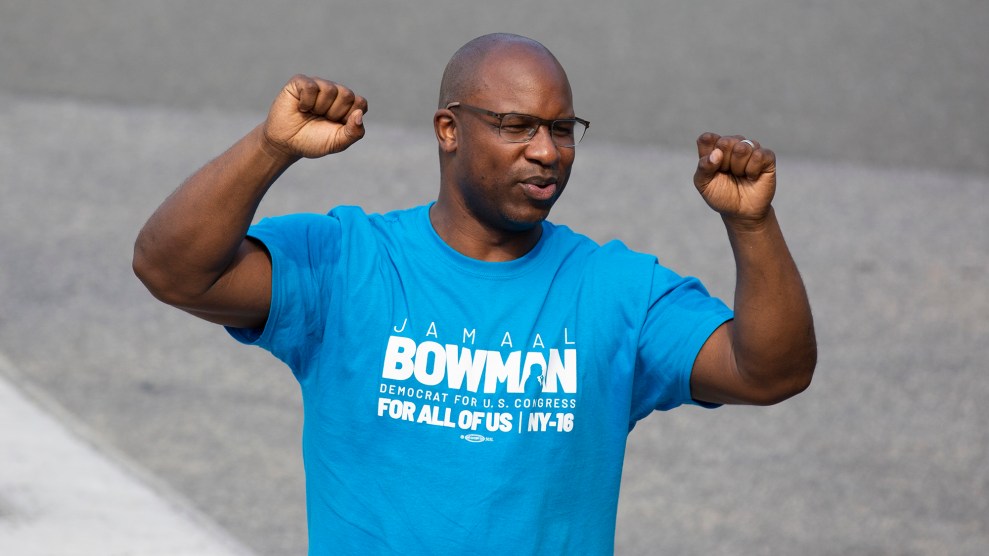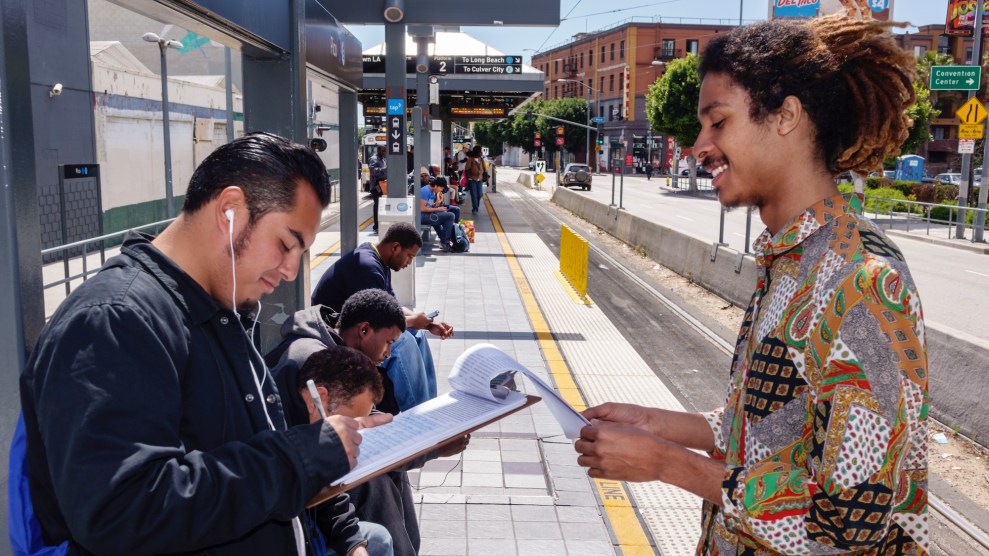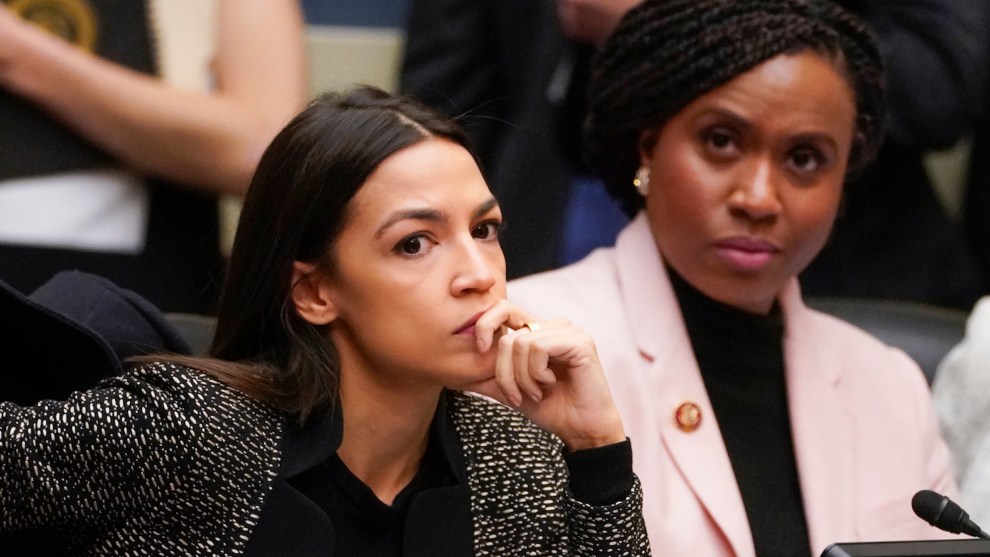
Cori Bush, left, is challenging Lacy Clay, a 10-term member of Congress, in Tuesday's Missouri Democratic primary.Mother Jones illustration; Jeff Roberson/AP; Bill Clark/Getty
Cori Bush smells tear gas when there isn’t any. Loud noises frighten her, reminders of police brandishing sniper rifles, firing rubber bullets, and revving the engines of armored vehicles. When the video of Minneapolis police officer Derek Chauvin kneeling on George Floyd’s neck began to circulate, Bush’s reaction was instinctual: “Don’t look at it.” She looked anyway.
For 400 days in 2014 and 2015, protesters gathered in Ferguson, Missouri, to register their outrage over the police killing of unarmed Black teenager Michael Brown. For most of those days, Bush joined them—at first, in her capacity as a registered nurse to tend to protesters’ injuries, and later as a community organizer on the front lines. She went out again in 2017 to organize after another white police officer was acquitted of murder in the 2011 shooting death of a Black man during a car chase in north St. Louis. This year, as Americans across the country protested Floyd’s killing, a white police officer in the St. Louis suburb of Florissant—Bush’s hometown—ran over a Black man with his unmarked SUV before getting out of the car to repeatedly kick him. And so Bush and her fellow Ferguson activists organized yet another demonstration against police brutality. During a June gathering, she tweeted that she had been pepper-sprayed in the eyes by the cops.
“It’s a reminder that we didn’t finish the work,” Bush, 43, tells me.
After Brown’s killing, Ferguson voters replaced several members of the city council, which now, like Ferguson itself, is majority Black. The city swore in its first Black police chief in 2016, and, two years later, the much-criticized county prosecutor who oversaw the investigation into Brown’s killing lost his seat in a primary. But for all the headway they’ve made at home, Ferguson activists have had little ability to rewrite the country’s broken criminal justice policies. “There’s only so much you can do when you don’t have that pen in your hand,” Bush says.
Half a decade after the Ferguson protests, Bush is in the final days of her second primary challenge against Rep. Lacy Clay (D-Mo.), who has held the St. Louis-area 1st congressional district since 2001. The race features two Black leaders with very different ideas about how to create change. Clay is a consummate insider who has spent decades building political power, which he has used to secure tangible, if incremental, progress on issues including police abuse. Bush, who is also an ordained minister, has little patience for incremental measures. She believes the district that helped turn Black Lives Matter into a national movement should have an activist in its congressional seat, someone who stands unwaveringly with BLM’s demands.
Bush began her career as a preschool teacher making minimum wage. After a decade with the same company, she’d worked her way up to become the school’s assistant director—but she still made only $9 per hour. She quit that job in 2001, when she became ill while pregnant with her second child. Not long after giving birth, she and her then-husband were evicted from the home they’d been renting. For several months, they lived out of the family’s Ford Explorer with their 14-month-old son and newborn daughter.
When her children were small, Bush got stuck in a cycle of debt with predatory personal loans. She borrowed small amounts—$250 here, $500 there—to cover rent, utility bills, and car repairs. “I remember one day I was sitting outside of the PayDay Loan office…I just remember thinking like, ‘Who speaks up for people like me?’” Bush recalls. “Why do I keep having to live like this?”
So for Bush, her crusade for office is personal. She supports Medicare for All because she gave up her employer-sponsored health insurance to run for office—and has to pay out of pocket for two hospitalizations for a suspected case of COVID-19. She supports tuition-free college because she had to pay off student loans. And she supports a $15 minimum wage because she made far less than that for so long. “I’ve struggled paycheck to paycheck, asking, ‘Where’s our progress?’” Bush narrates in her first television ad. “As a Black mom, I’m sick of having to say, ‘Just make it home safely.’”
The thing is…Clay supports these things, too. He’s been a cosponsor of Medicare for All since former Rep. John Conyers (D-Mich.) first introduced it in 2003. He sided with progressives by voting against Trump’s replacement for NAFTA. He cosponsored the Green New Deal. In the most recent session of Congress, he signed onto Rep. Alexandria Ocasio-Cortez’s (D-N.Y.) bill that would cap credit card interest rates at 15 percent—a limit that some of his more moderate colleagues on the House Financial Services Committee found preposterously low.
Then there’s criminal justice. Two months before the 2014 Ferguson uprising, Clay had joined a majority of Democrats in voting against a measure that would have ended the transfer of military equipment to police. But in the days that followed Brown’s death, he co-authored a letter to Attorney General Eric Holder demanding the Justice Department investigate the shooting and any patterns of police misconduct. The DOJ did investigate, ultimately clearing the officer who killed Brown but issuing a damning report that determined Ferguson police were routinely “stopping people without reasonable suspicion, arresting them without probable cause, and using unreasonable force against them.” The St. Louis American, the local Black newspaper, endorsed Clay’s reelection bid in 2018, observing that his “insider game in Washington” had helped bring about the probe, which ultimately resulted in a consent decree under which the city agreed to legally binding reforms. “St. Louis will be better served by having an experienced congressman with nearly two decades of seniority,” the paper concluded.
This year, while Bush was protesting Floyd’s murder, Clay and many of his colleagues in the Congressional Black Caucus were shaping the Democrats’ landmark police reform legislation. The measure stops short of activists’ demands to “defund the police,” but it would establish a national registry of police misconduct, end qualified immunity—which prevents citizens from suing individual officers—and ban chokeholds. Clay’s contributions to the bill would mandate deescalation training for officers, require that deadly force only be employed as a last resort, and provide for the appointment of an independent prosecutor anytime deadly force is used. The bill passed the House on June 25, exactly one month after Floyd died.
“It is the role of an activist to push us as far as they can push us. It is our role to legislate, and that is a different role,” CBC chair Rep. Karen Bass (D-Calif.)—herself a longtime civil rights activist—told Politico in June, as the bill was working its way through the House. “We are very committed to making a difference, and that is different than making a point. You can either make a point, or you can make a difference.”
Bush’s run against Clay doesn’t neatly follow the pattern of successful progressive primary challenges, which have lately excelled on two planes. One is ideology: Former marketing executive Marie Newman defeated Rep. Dan Lipinski (Ill.) this past March on the premise that no sitting House Democrat should oppose abortion rights. Another is representation: Two years ago, Rep. Ayanna Pressley (Mass.) unseated Rep. Michael Capuano, a bona fide progressive, by arguing in part that her life experience would help her better serve her majority-minority district. Jamaal Bowman’s recent win against New York Rep. Eliot Engel succeeded on both fronts—as did Ocasio-Cortez’s 2018 victory over House Democratic caucus chair Joseph Crowley.
Bush is challenging Clay on a third dimension: The rigor with which he fights for his constituents. As an example, she points to the House’s police bill. “I think they’re too soft,” she says of its provisions, criticizing the lack of any “real ‘defund’ language.” Bush has also slammed Clay’s coziness with corporate interests. Three-quarters of the nearly $750,000 Clay raised through June of this year came from political action committees, nearly 80 percent of which are backed by big business. His top campaign contributor is Quicken Loans, a mortgage giant that Clay is charged with overseeing from his perch on the Financial Services Committee. In 2015, the Justice Department sued Quicken for originating hundreds of home loans for borrowers who weren’t eligible for them. (The company agreed to pay $32.5 million to settle the case without admitting wrongdoing.)
Clay maintains that his fundraising has no bearing on how he votes. But Fight Corporate Monopolies, a progressive group, placed a six-figure television ad buy to revisit an episode in which Clay sided with financial services companies to fight against a rule that would force investment advisers to act in their clients’ best interests. (The rule took effect, but a GOP-appointed judge later gutted it, and Clay has since joined other Democrats in calling for its reinstatement.)
“It doesn’t always align perfectly with a vote—often, stagnation is in return for a corporate donation,” says Morgan Harper, a former Consumer Financial Protection Bureau adviser who recently waged an unsuccessful primary challenge against Rep. Joyce Beatty (D-Ohio) and now advises Fight Corporate Monopolies. “We need someone who is fighting for progressive policies that make sure the economy is working for everyone—with the maximum level of aggression that’s possible.”
The CBC counts some of Congress’ most progressive lawmakers among its members, including Pressley and Rep. Ilhan Omar (D-Minn.), who regularly oppose the positions of Democratic congressional leaders. But many CBC members align closely with House Speaker Nancy Pelosi (D-Calif.) and are staunch defenders of institutional norms like seniority. Few so closely embody that guiding principle as Clay, who won his seat upon the retirement of his father, a civil rights activist and founding member of the CBC who served in Congress for 32 years. Between the two of them, a Clay has represented the district for more than half a century.
CBC allies view that longevity as an asset. “Seniority has played an important role in the rise of the CBC,” a source close to Clay says. “The reality is that elevating those CBC members who have been there for 10 or 20 or 30 years has played a key part in the CBC’s ability to gain chairmanships and leadership roles and become as powerful as it is today.”
Bush sees things differently. “If that seniority is not benefiting the people directly anymore, then it’s time to retire,” she tells me.
In recent cycles, the CBC’s political action committee has supported some long-serving white incumbents over their Black opponents—it backed Capuano and Engel, for instance—and its members generally do not take kindly to primary challenges. This cycle, Justice Democrats, which played a role in Ocasio-Cortez’s and Pressley’s 2018 victories, endorsed challengers against two CBC members: Clay and Beatty. Some members of the CBC were livid. Clay told The Hill that Justice Democrats’ actions were “a bunch of B.S.” and “insulting” to his constituents, likening their attempts to “devastate the party” to the “Russian trolls of 2016.”
“They want to come back again this year?” he told the Washington Post, referring to the progressive groups supporting Bush’s second attempt to oust him. “That’s fine. I’m going to kick their [posterior] again, okay?”
Clay defeated Bush by nearly 20 points in 2018, but he’s nevertheless taking this year’s primary seriously, launching a series of sharply negative attacks in the final days of the race. His campaign circulated a mailer that notes Bush failed to pay taxes four times in recent years, that she’s been evicted three times, and that her nursing license was suspended. In essence, the fusilade amounts to criticism of Bush for being poor. Bush’s campaign says her license was suspended because she couldn’t afford to pay her taxes, and she’d been evicted because she couldn’t afford her rent. The Clay campaign did not respond to a request for comment.
Those attacks may have less efficacy than Clay imagines in this political moment, when Americans are attuned to the legacies of systemic racism more than ever before. And a sea of new donors have appeared on Bush’s side: She raised $170,000 in June as nationwide protests raged, an amount that accounts for nearly a third of all the money she’s brought in this cycle. She received an endorsement from Bernie Sanders, for whom she served as a national surrogate, as well as from the recently victorious Bowman.
Notably absent from this growing list of supporters is Ocasio-Cortez, who hasn’t weighed in on the race this time around. But Justice Democrats is giving Bush more financial support than it did last cycle: In addition to the $40,000 the group helped her raise, its independent expenditure is now running a TV ad on her behalf.
Bush thinks the momentum is on her side. “Because of the work that we did [in Ferguson in 2014], such a foundation was laid to where some of this is easier for people—so more people have been activated,” she says. “Now people are looking for those candidates. They’re like, ‘Okay, you’ve been actually doing this work.’ That has been a huge boost to our campaign.”


















